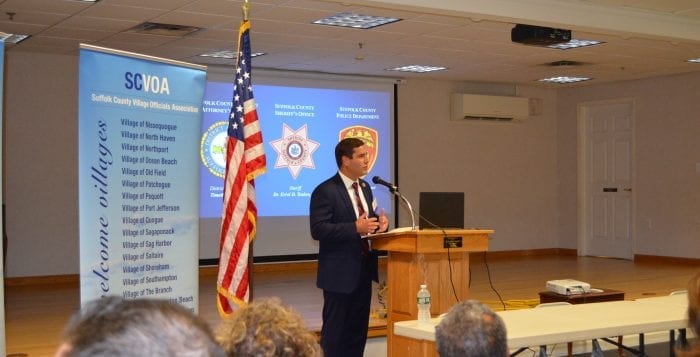Suffolk County Village Officials Association, which represents 32 villages, hosted a special presentation on the opioid crisis Sept. 26 at the Lake Grove Village Hall.
District Attorney Tim Sini (D), Suffolk Police Commissioner Geraldine Hart and Sheriff Errol Toulon Jr. (D) all spoke to the group about how the crisis has fueled a regional surge in illegal firearms seizures and sex trafficking crimes.
Most criminal cases in the county, the officials said, relate to opioid epidemic.
People initially became addicted to prescription painkillers and over time, as demand increased, supply went down, and prices went up. So, people gravitated toward heroin, the DA said, which is more potent and more dangerous. Drug dealers, who realized that money can be made, began cutting their product with the synthetic opioid fentanyl, and more recently with fentanyl variations known as analogs. Fentanyl, Sini said, originates in China and is coming into the United States through the Mexican border. The drug is also being sent into the U.S. over the Canadian border and from China through the U.S. mail.
County officials said they are drilling down as hard as possible.
Since 2016, the federal government assigned an analyst exclusively to Suffolk County Police Department to examine overdose information with maps and weekly and monthly overdose reports. The mapping system, known as High Intensity Drug Trafficking Areas program, or HIDTA, provides a real-time picture of overdoses. It also helps identify and coordinate candidates for the county’s preventing incarceration via opportunities for treatment program known as PIVOT for short.
“Everything we do is driven by analytics,” Hart said.
The county has also been using court-sanctioned surveillance methods such as phone tapping and search warrants to crack down on drug crimes. It issued more than 350 narcotics search warrants in 2018 and has eavesdropped on more than 150 phone lines. Consequently, the county has seized greater amounts of certain drugs and illegal firearms.
The officials said during their presentation that it’s targeting dealers who cause overdoses and charging them with manslaughter. Sini said that through surveillance, he’s learning that tougher manslaughter statutes result in dealers turning away from deadly drugs to instead
peddle nonlethal drugs.
In 2018, the county also launched a sex trafficking unit that has identified and interviewed more than 200 sex trafficking victims. It has arrested 34 people for 235 counts of sex-trafficking related charges and learned during the interviews how drug traffickers use opioids to addict young women to keep them dependent.
Toulon said that they’re gathering information while the women are in the sheriff’s facility, which is providing other useful information on drug and sex traffickers.
Victims, while in the sheriff’s facility, are involved in vocational and educational programs and put in touch with nongovernmental organizations that assist with counseling, drug treatment and job training. A big problem, though, Toulon said, is housing.
County officials emphasized that human trafficking is happening right here, right now in our communities. It can affect anyone from your neighbor to your niece and nephew.
Officials are also calling for the use of different terminology for prostitution.
“It’s a modern-day form of slavery and needs to be called what it is: sex trafficking,” Hart said. The force has historically arrested the women and that was the case, Hart said, but the county’s approach is shifting and officials are now looking at the women as victims.
Officials are asking people to trust their own instincts.
“If you’re at a 7-Eleven and you see an older man in a car with a young woman who looks distressed, call or text us,” the officials said.
The county initiated a Text-a-Tip program. To reach officials, text TIP SUFFOLK to the number 888-777. Residents can confidentially share any information related to illicit or suspicious activity, including drug use or trafficking, Toulon said.
Paul Tonna, who serves as executive director of the village organization, said in a telephone interview after the event that a group of mayors were previously given a private presentation on the topic in graphic detail. The situation, he said, is horrible. The women are being forced to perform six or seven sex acts a day. He is calling for people such as PTAs and religious groups to sponsor awareness campaigns with officials.
Local villages have resources, Tonna said, such as constabulary that can also become the eyes and ears of county officials.
“We’re not here to say you need to do more,” Sini said. ”We need to think outside of the box. Because of collective efforts, we can make greater strides.”
Ann Marie Csorny is director of Suffolk County Department of Health Services’ Community Mental Hygiene Services. The Prevention Resource Center, run by the Family Service League, she said, offers effective tools for those working to prevent drug and alcohol abuse. Villages and towns, she said, should tap into coalitions that exist or start to build their own coalitions.
“Communities can have a great impact in terms of preventing or reducing drug use, alcohol abuse and related problems when they understand and promote coalition building,” she said. “This can be very exciting in that involved communities promote civic engagement and the building of shared understanding, shared norms, shared values, trust, and cooperation.”








